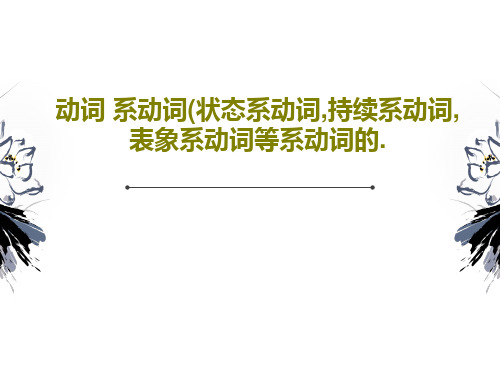高考英语系动词专项讲解 (共44张PPT)
合集下载
系动词公开课PPT课件

主句之间的逻辑关系。
be与助动词连用
总结词:虚拟语气
详细描述:在虚拟语气中,系动词be可以与其他助动词一起使用,构成“would/should/might/could be+动词ing”或 “would/should/might/could be+过去分词”结构。这些结构用于表达与现实相反的情况或假设条件,强调某个动作或状 态的可能性或假设性。
02 系动词的常见形式
CHAPTER
be型系动词
总结词
表示状态和特征
详细描述
be型系动词包括am, is, are, was, were等,用于描述主语的状态或特征,例如 “I am tall.”(我个子高)。
感官系动词
总结词
描述感知和经验
详细描述
感官系动词包括feel, sound, taste, look, smell等,用于描述主语给人的感觉或经 验,例如“The music sounds beautiful.”(音乐听起来很美)。
谢谢
THANKS
总结词:常见用法
详细描述:在英语中,系动词be经常与其他助动词一起使用,以构成各种时态、 语态和语气。常见的be与助动词连用的结构包括“be+助动词+动词ing”和 “be+助动词+过去分词”。这些结构在表达时间、条件、目的和方式等方面具 有重要作用。
be与助动词连用
总结词
非谓语动词形式
详细描述
系动词be可以与不定式或动名词形式的非谓语动词连用,构成“be+不定式”或 “be+动名词”结构。这种结构常用于表达目的、条件或结果,强调某个动作或状态与
变化系动词
总ห้องสมุดไป่ตู้词
be与助动词连用
总结词:虚拟语气
详细描述:在虚拟语气中,系动词be可以与其他助动词一起使用,构成“would/should/might/could be+动词ing”或 “would/should/might/could be+过去分词”结构。这些结构用于表达与现实相反的情况或假设条件,强调某个动作或状 态的可能性或假设性。
02 系动词的常见形式
CHAPTER
be型系动词
总结词
表示状态和特征
详细描述
be型系动词包括am, is, are, was, were等,用于描述主语的状态或特征,例如 “I am tall.”(我个子高)。
感官系动词
总结词
描述感知和经验
详细描述
感官系动词包括feel, sound, taste, look, smell等,用于描述主语给人的感觉或经 验,例如“The music sounds beautiful.”(音乐听起来很美)。
谢谢
THANKS
总结词:常见用法
详细描述:在英语中,系动词be经常与其他助动词一起使用,以构成各种时态、 语态和语气。常见的be与助动词连用的结构包括“be+助动词+动词ing”和 “be+助动词+过去分词”。这些结构在表达时间、条件、目的和方式等方面具 有重要作用。
be与助动词连用
总结词
非谓语动词形式
详细描述
系动词be可以与不定式或动名词形式的非谓语动词连用,构成“be+不定式”或 “be+动名词”结构。这种结构常用于表达目的、条件或结果,强调某个动作或状态与
变化系动词
总ห้องสมุดไป่ตู้词
系动词的用法PPT讲稿

She turned blue with cold. 她冻得脸色发青了。 The leaves turn yellow.
3. grow: 和
数 不 用 于 进
不 用 于 被 动
馨 提 示
:
所
feel )
主要表示逐渐变化,强调变化的过程. eg: The sea is growing calm. 大海变得平静起来。
系动词的用法课件
•系动词 •分类
注意事项
系动词
1.状态类
be (是), keep (保持), stay (保持), remain (依然), seem (似乎是)
系 2.“感官”类 动
词 分 类
3. “变化”类
典例
“状态”
探究
类
1. be动词:
I am in a middle school.
She/He is a doctor.
eg: It’s becoming / getting cold (dark, cloudy, etc). Divorce is becoming / getting more common. Last night I got lost in the new city.
“变化”类
2.turn用于人或事物颜色的变化。
look (看起来),
sound (听起来), smell (闻起来),
系
taste (尝起2来.“)感, 官”类 动
feel (摸起来/
词
感到)
分
类
3. “变化”类
典例
“感官”
探究
类
sea1s.hTehllse。Sydne常y O搭pe配ra H形ou容se词looks like 或
动词 系动词(状态系动词,持续系动词,表象系动词等系动词的.PPT文档共43页

动词 系动词(状态系动词,ቤተ መጻሕፍቲ ባይዱ续系动词, 表象系动词等系动词的.
36、“不可能”这个字(法语是一个字 ),只 在愚人 的字典 中找得 到。--拿 破仑。 37、不要生气要争气,不要看破要突 破,不 要嫉妒 要欣赏 ,不要 托延要 积极, 不要心 动要行 动。 38、勤奋,机会,乐观是成功的三要 素。(注 意:传 统观念 认为勤 奋和机 会是成 功的要 素,但 是经过 统计学 和成功 人士的 分析得 出,乐 观是成 功的第 三要素 。
END
39、没有不老的誓言,没有不变的承 诺,踏 上旅途 ,义无 反顾。 40、对时间的价值没有没有深切认识 的人, 决不会 坚韧勤 勉。
16、业余生活要有意义,不要越轨。——华盛顿 17、一个人即使已登上顶峰,也仍要自强不息。——罗素·贝克 18、最大的挑战和突破在于用人,而用人最大的突破在于信任人。——马云 19、自己活着,就是为了使别人过得更美好。——雷锋 20、要掌握书,莫被书掌握;要为生而读,莫为读而生。——布尔沃
36、“不可能”这个字(法语是一个字 ),只 在愚人 的字典 中找得 到。--拿 破仑。 37、不要生气要争气,不要看破要突 破,不 要嫉妒 要欣赏 ,不要 托延要 积极, 不要心 动要行 动。 38、勤奋,机会,乐观是成功的三要 素。(注 意:传 统观念 认为勤 奋和机 会是成 功的要 素,但 是经过 统计学 和成功 人士的 分析得 出,乐 观是成 功的第 三要素 。
END
39、没有不老的誓言,没有不变的承 诺,踏 上旅途 ,义无 反顾。 40、对时间的价值没有没有深切认识 的人, 决不会 坚韧勤 勉。
16、业余生活要有意义,不要越轨。——华盛顿 17、一个人即使已登上顶峰,也仍要自强不息。——罗素·贝克 18、最大的挑战和突破在于用人,而用人最大的突破在于信任人。——马云 19、自己活着,就是为了使别人过得更美好。——雷锋 20、要掌握书,莫被书掌握;要为生而读,莫为读而生。——布尔沃
系动词ppt课件

Choose the best answer
1. The discussion_____ alive when an interesting topic was brought in. A.was coming B.had come C.has come D. came
2. Happy birthday, Alice! So you have ____ twenty-one already! A.become B.turned C.grown D. passed
3. The traffic lights_____ green and I pulled away. A. came B.grew C. got D. went
4. --- Is your headache getting _____?
--- No, it’s worse.
A. better
B. bad
3. “状态变化”类: 表示主语从一种 状态变化成另一种状态。
常见的有: become, turn, grow, go, come, fall, get 等。 例如: Put the fish in the fridge, or it will go bad in hot weather.
状态变化系动词
成系表结构,说明主语的状态、性质、
特征等。 看起来 look: look smart
表感觉和 听起来 sound: sound noisy
知觉的 系动词
尝起来 taste: taste delicious 摸起来 feel: feel soft
闻起来 smell: smell sweet
Complete the sentences with the correct form of the words in the box. (Activity 2)
系动词及其用法PPT课件

03
系动词的特殊用法
与介词连用的系动词
be与in的连用
表示“在某一方面/方面存在”。 例如:He is in charge of the project. (他负责这个项目。)
be与on的连用
表示“在某一方面/方面进行中” 。例如:The meeting is on next week. (会议在下周进行。)
系动词及其用法PPT 课件
目录
• 系动词的定义与分类 • 系动词的基本用法 • 系动词的特殊用法 • 系动词的常见错误用法 • 系动词的练习与巩固
01
系动词的定义与分类
什么是系动词
01
系动词是用来连接主语和表语的 动词,表示主语的特征、状态或 性质。
02
它通常出现在句子的谓语部分, 用来描述主语的状态或情况。
表示状态的持续与变化
be与表示时间的介词连用
表示状态的持续。例如:I will be at work until 5 o'clock. (我将工作到5点。)
be与表示变化的介词连用
表示状态的变化。例如:The weather is becoming warmer. (天气正在变暖。)
表示主语的属性与特征
表语性动词与行为动词的混用
总结词
将表语性动词误用作行为动词
VS
详细描述
有些动词既可以作为表语性动词(表示主 语的属性或状态),也可以作为行为动词 (表示主语执行的动作)。在使用这些动 词时,应避免混淆其用法。例如,应使用 "The movie is over"(表语性用法)而不 是"The movie over"(行为动词用法)。
be与形容词连用
表示主语的属性。例如:The book is interesting. (这本书 很有趣。)
(2021)系动词和情态动词完美版PPT

中考考点
考点过关
语法互动(八)┃ 系动词和情态动词
[注意] can 只能用于现在时和过去时两种时态, be able to 可 用于各种时态。另外 can't 可表示否定推测。如:
That _c_a_n_'_t_ be Mr. Wang. He has gone to Beijing.
那肯定不是王老师。他已经去北京了。 2.may和might的用法 may(might)意为“可以”,表示说话人同意、许可或请求对方许可, 也可表示祝愿。may的否定式为 may not。might 是may 的过去式。 might 有两种用法:一种表示过去式;一种表示虚拟语气,使语气 更加委婉、客气,或表示可能性更小。如:
—Must I go home now?—No, you __n_e_e_dn't/don't have to_.
“我必须现在回家吗?” “不,没必要。” (3)must 可以表示肯定推测,意为“一定”。如: The man must be our teacher. 那个人一定是我们的老师。
中考考点
It is raining hard outside. I _h_ave t_o___ stay at home.
外面雨下得很大,我不得不待在家里。
中考考点
考点过关
语法互动(八)┃ 系动词和情态动词
(2)回答must 的提问 ①肯定回答:Yes,…must. 如: —Must I go home now? —Yes, you must. “我必须现在回家吗?” “是的,你必须。” ②否定回答:No,…needn't./No,…don't/doesn't have to. 如:
高中英语动词讲解课件(共65张PPT)

loDo.ykoeud’rfeorcwaallrindBgto______at
last.
ing B.came e es
4.Mr Smith warned her soAn ____ after drinking.
A.never to drive B.to never drive
will_B____hot
for
another
two
st B.remain C.get D.turn
2.The hot weather will ____another two days.
st B.remain AC.get D.turn
3.The boss made them _____12 hours a day.
colour, keep, find, get,leave,make,paint,cut
Eg: Please colour it red. I find it interesting.
get / leave / keep / set / catch / have sb. doi ng;
1.没有被动形式,如happen,occur,rise,lie,die
2.主动表示被动的词 动词+ (well,poorly,easily) sell, wash, burn, cook, cut, drive, dress, play,
last, open, write, start, run, read, operate, break, measure, weigh
Eg: They have known each other for twenty years. (现在完成时)
He had built a chemistry lab for himself at the age of ten.(过去完成时)
高考英语语法 词类精讲之动词概述 课件 (共54张PPT)

• The worker looked at the machine carefully.
• 2、有些动词既可以用作及物动词,也可以用作 不及物动词。
• eg: I read newspaper every morning. (vt)
• I can never read or write. (vi)
The prize was awarded to him.
Mum cooked us fish.
Fish was cooked for us. The father made his son a kite.
A kite was made for his son by the father.
原句为“动词+宾语+补足语”结构的句子,变被动语 态结构时将原句宾语提前用作新句主语(代词用主 格),后面跟be done+补足语。
一、定义: 实义动词,又叫行为动词,是可以在句中 单独做谓语的动词。
• 实义动词的分类:根据其能否直接跟宾语这 一属性,实义动词分为及物动词和不及物动 词这两类。
eg. We shake hands when we make a deal. I bought cannabis from a man in the street. It means, “we agree and we trust each other. Birds can fly.
实义动词有五种基本变化形式,分别是原形、过去 式、过去分词、第三人称单数形式和现在分词形式。
实义动 词五种 变化形 式(以 do为例)
eg. Somehow he survived. This last experience had a profound effect on him. Noah Webster graduated from Yele University in 1778. So he began his work on American English. The rain poured down.
• 2、有些动词既可以用作及物动词,也可以用作 不及物动词。
• eg: I read newspaper every morning. (vt)
• I can never read or write. (vi)
The prize was awarded to him.
Mum cooked us fish.
Fish was cooked for us. The father made his son a kite.
A kite was made for his son by the father.
原句为“动词+宾语+补足语”结构的句子,变被动语 态结构时将原句宾语提前用作新句主语(代词用主 格),后面跟be done+补足语。
一、定义: 实义动词,又叫行为动词,是可以在句中 单独做谓语的动词。
• 实义动词的分类:根据其能否直接跟宾语这 一属性,实义动词分为及物动词和不及物动 词这两类。
eg. We shake hands when we make a deal. I bought cannabis from a man in the street. It means, “we agree and we trust each other. Birds can fly.
实义动词有五种基本变化形式,分别是原形、过去 式、过去分词、第三人称单数形式和现在分词形式。
实义动 词五种 变化形 式(以 do为例)
eg. Somehow he survived. This last experience had a profound effect on him. Noah Webster graduated from Yele University in 1778. So he began his work on American English. The rain poured down.
- 1、下载文档前请自行甄别文档内容的完整性,平台不提供额外的编辑、内容补充、找答案等附加服务。
- 2、"仅部分预览"的文档,不可在线预览部分如存在完整性等问题,可反馈申请退款(可完整预览的文档不适用该条件!)。
- 3、如文档侵犯您的权益,请联系客服反馈,我们会尽快为您处理(人工客服工作时间:9:00-18:30)。
2.smell“闻起来”,后接adj.,分词。 • The flowers smell sweet. 3.sound“听起来”,后接adj.,分词。 • The music sounds sweet. 4.taste“尝起来”,后接adj.,分词。 • The apples taste very good.
himself, fell silent. • My father fell ill and died. 3.grow“渐渐变得……起来,长得” • You will grow used to it. • It’s growing warm.
4.turn“转变成(新的与原来完全不同的色 彩或性质),变质(色)”。
• The camels can smell the water a mile off.
• 骆驼能嗅出一英里外有水。
②指“嗅、闻”的动作时,实义动词,可用 于进行时态。
• The girl is smelling the flower.
③smell指“含有……气味”,“发出……气 味”等事物性质时,半系动词,无进行时 态。
(“看着”,实义动词用法)
• 在英语中,某一动词是多义词,既有实义 动词用法,又有系动词用法。常见的有:
• listen, look ,touch ,hear,see , sound ,feel, taste ,remain ,keep ,stay, turn,become
二、根据系动词的意义,分为四类:
3)表像系动词 • 用来表示"看起来像"这一概念,主要有
seem, appear, look, 例如: • He looks tired. • He seems (to be) very sad. 4)感官系动词 • 主要有feel, smell, sound, taste, 例如: • This kind of cloth feels very soft. • This flower smells very sweet.
• The doctor is feeling her pulse.
• 医生正在给她把脉(有意识的动态动作)
• The soup tastes good.
• 这汤的味道不错(静态性质,无进行时)
• The cook is tasting the soup.厨师在尝 汤的味道。(动态动作,有进行时)
(2)表示一种探询口气,使语言客气、生动、 亲切。例如:
• I hope you are keeping well. (语气委婉) • Are you feeling any better? (语气亲切) • 试比较: • Your hand feels cold. • 你的手摸起来冰凉(无意识的静态性质 ) • 不可以说: • Your hand is feeling cold.(×)
• 6.become“变成,成为(好坏均可的情 况)”
• He became angry with me.
• It became dark.
• They became good friends.
• I became interested in drawing.
7.come,“变成为(已知的状态),证实 为”,后接形容词或前缀un-的过去分词作 表语,表示状态或情况的变化。
系动词பைடு நூலகம்
• 系动词又称联系动词,作为系动词,它本 身有词义,但不能单独用作谓语,后边必 须跟表语(也称补语),构成系表结构说 明主语的状况、性质、特征等情况。
• 有些系动词又是实义动词,该动词表达实 义时,有词义,可单独作谓语,例如:
• He fell ill yesterday.
(fall是系动词,后跟补足语,说明主语情况
• The material has gone a funny colour. (奇怪)
• go之后常接的adj. 还有:bad, blind, wild, wrong, sour, hard, hungry, mad, red, with, anger, white, pale, blue, grey
III.系动词用法应注意的八个问题
1.系动词的进行时态应分情况讨论
• 一般,状态系动词无进行时态,而动态系 动词有进行时态。但在某些情况下,状态 系动词也有进行时态,表示两个用途:
(1)表示一种短暂的、反常的状态。如:
• He is being kind.
他装出和蔼可亲的样子(一时而不能持久的 性质)
• Maple trees turn red in autumn.
• It was cloudy this morning, but fortunately it has turned fine.
• He has turned writer. (注意:此时writer之前无冠词a.)
• 5.go,“变成(某种坏的状态)” • The telephone has gone dead.
5.feel①“摸起来,给……感觉”;②“觉 得”,后接adj
• The silk feels very soft. • You will feel better after a night’s
sleep. B.状态系动词: 1.be,“是”,完全系动词。 • I am a student. 2.seem,“似乎,好像”,完全系动词。 • They seem quite happy.
7.prove “证明是”,半系动词,后接adj. ,n.
• The treatment proved to be successful.
C.动态系动词:都属于半系动词,描述状态 变化过程。
1.get“变成,变得……起来”,后可接形 容词、分词、介词短语。
• The days are getting longer and longer.
• The dinner smells good.
2.系动词的时态与形容词的比较级连用的问 题
• 某些含有变化意义的动态系动词如get, become, grow, turn等的进行时态可与形 容词的比较级连用,表示渐进过程,其意 思是“越来越……”。
• He is growing taller and taller.
• He fell off the ladder.
(fall是实义动词,单独作谓语。)
1)状态系动词 用来表示主语状态,只有be一词,例如: • He is a teacher. (is与补足语一起说明主语的身份。) 2)持续系动词 • 用来表示主语继续或保持一种状况或态度
,主要有keep, rest, remain, stay, lie, stand, 例如: • He always kept silent at meeting. • This matter rests a mystery.
4.keep, “保持……的状态”,半系动词, 后接adj或介词短语。
• You’d better go to bed and keep warm.
5.remain,“仍是”,半系动词。
• I remained silent.
6.stay“保持(某种状态)”,半系动词, 后接adj.、过去分词。
• The window stayed open all the night.
• 总之,系动词有无进行时态应随系动词的 意义或其语境变化而变化。在概述某一动 词的进行时态时,不能笼统地说feel, smell无进行时,应指出其意义及其语用环 境。 以smell为例
①smell作“嗅觉”的能力时,虽是实义动词 ,但指的是一种性质的存在状态不能用于 进行时态,常与can, could, be able to连 用。
8.run,“变成”,后接adj. • The well has run dry. • The price ran high. 9.make,“达到某种状态[后接形容词],
如sure, certain, merry, bold, free • We must make certain of facts.
• His wish to become a pilot has come true.
• If you look into the matter, everything will come clear.
• My shoelaces have come undone.
• 后面常接的形容词还有:apart, dear(昂 贵),natural, open, untied(松开)。
我们一定要弄清事实。 • The Children make free with the
apples. 孩子们随便吃苹果。
D.双谓语系动词 • 此类系动词既有系动词的功能,后接表语
,又保留原实义动词本身的含义。例如: • The run rose red. 太阳升起红艳艳。 • She stopped and stood quite still. • The book lay open on the table. • The snow lay thick on the ground. • He married young. • The window blew open.
A.五大感官系动词 B.状态系动词
C.动态系动词
D.双谓语系动词
• A.五大感官系动词,描述一种感官性质。 由实义感官动词变化而来,都是半系动词
1.look“看起来像是”,后接adj.、n.、分 词、介词短语、不定式等。
• The girl bit her lips and looked thoughtful.
• The train didn’t get going again.
• It’s nothing to get excited about.
• My watch gets out of order.
himself, fell silent. • My father fell ill and died. 3.grow“渐渐变得……起来,长得” • You will grow used to it. • It’s growing warm.
4.turn“转变成(新的与原来完全不同的色 彩或性质),变质(色)”。
• The camels can smell the water a mile off.
• 骆驼能嗅出一英里外有水。
②指“嗅、闻”的动作时,实义动词,可用 于进行时态。
• The girl is smelling the flower.
③smell指“含有……气味”,“发出……气 味”等事物性质时,半系动词,无进行时 态。
(“看着”,实义动词用法)
• 在英语中,某一动词是多义词,既有实义 动词用法,又有系动词用法。常见的有:
• listen, look ,touch ,hear,see , sound ,feel, taste ,remain ,keep ,stay, turn,become
二、根据系动词的意义,分为四类:
3)表像系动词 • 用来表示"看起来像"这一概念,主要有
seem, appear, look, 例如: • He looks tired. • He seems (to be) very sad. 4)感官系动词 • 主要有feel, smell, sound, taste, 例如: • This kind of cloth feels very soft. • This flower smells very sweet.
• The doctor is feeling her pulse.
• 医生正在给她把脉(有意识的动态动作)
• The soup tastes good.
• 这汤的味道不错(静态性质,无进行时)
• The cook is tasting the soup.厨师在尝 汤的味道。(动态动作,有进行时)
(2)表示一种探询口气,使语言客气、生动、 亲切。例如:
• I hope you are keeping well. (语气委婉) • Are you feeling any better? (语气亲切) • 试比较: • Your hand feels cold. • 你的手摸起来冰凉(无意识的静态性质 ) • 不可以说: • Your hand is feeling cold.(×)
• 6.become“变成,成为(好坏均可的情 况)”
• He became angry with me.
• It became dark.
• They became good friends.
• I became interested in drawing.
7.come,“变成为(已知的状态),证实 为”,后接形容词或前缀un-的过去分词作 表语,表示状态或情况的变化。
系动词பைடு நூலகம்
• 系动词又称联系动词,作为系动词,它本 身有词义,但不能单独用作谓语,后边必 须跟表语(也称补语),构成系表结构说 明主语的状况、性质、特征等情况。
• 有些系动词又是实义动词,该动词表达实 义时,有词义,可单独作谓语,例如:
• He fell ill yesterday.
(fall是系动词,后跟补足语,说明主语情况
• The material has gone a funny colour. (奇怪)
• go之后常接的adj. 还有:bad, blind, wild, wrong, sour, hard, hungry, mad, red, with, anger, white, pale, blue, grey
III.系动词用法应注意的八个问题
1.系动词的进行时态应分情况讨论
• 一般,状态系动词无进行时态,而动态系 动词有进行时态。但在某些情况下,状态 系动词也有进行时态,表示两个用途:
(1)表示一种短暂的、反常的状态。如:
• He is being kind.
他装出和蔼可亲的样子(一时而不能持久的 性质)
• Maple trees turn red in autumn.
• It was cloudy this morning, but fortunately it has turned fine.
• He has turned writer. (注意:此时writer之前无冠词a.)
• 5.go,“变成(某种坏的状态)” • The telephone has gone dead.
5.feel①“摸起来,给……感觉”;②“觉 得”,后接adj
• The silk feels very soft. • You will feel better after a night’s
sleep. B.状态系动词: 1.be,“是”,完全系动词。 • I am a student. 2.seem,“似乎,好像”,完全系动词。 • They seem quite happy.
7.prove “证明是”,半系动词,后接adj. ,n.
• The treatment proved to be successful.
C.动态系动词:都属于半系动词,描述状态 变化过程。
1.get“变成,变得……起来”,后可接形 容词、分词、介词短语。
• The days are getting longer and longer.
• The dinner smells good.
2.系动词的时态与形容词的比较级连用的问 题
• 某些含有变化意义的动态系动词如get, become, grow, turn等的进行时态可与形 容词的比较级连用,表示渐进过程,其意 思是“越来越……”。
• He is growing taller and taller.
• He fell off the ladder.
(fall是实义动词,单独作谓语。)
1)状态系动词 用来表示主语状态,只有be一词,例如: • He is a teacher. (is与补足语一起说明主语的身份。) 2)持续系动词 • 用来表示主语继续或保持一种状况或态度
,主要有keep, rest, remain, stay, lie, stand, 例如: • He always kept silent at meeting. • This matter rests a mystery.
4.keep, “保持……的状态”,半系动词, 后接adj或介词短语。
• You’d better go to bed and keep warm.
5.remain,“仍是”,半系动词。
• I remained silent.
6.stay“保持(某种状态)”,半系动词, 后接adj.、过去分词。
• The window stayed open all the night.
• 总之,系动词有无进行时态应随系动词的 意义或其语境变化而变化。在概述某一动 词的进行时态时,不能笼统地说feel, smell无进行时,应指出其意义及其语用环 境。 以smell为例
①smell作“嗅觉”的能力时,虽是实义动词 ,但指的是一种性质的存在状态不能用于 进行时态,常与can, could, be able to连 用。
8.run,“变成”,后接adj. • The well has run dry. • The price ran high. 9.make,“达到某种状态[后接形容词],
如sure, certain, merry, bold, free • We must make certain of facts.
• His wish to become a pilot has come true.
• If you look into the matter, everything will come clear.
• My shoelaces have come undone.
• 后面常接的形容词还有:apart, dear(昂 贵),natural, open, untied(松开)。
我们一定要弄清事实。 • The Children make free with the
apples. 孩子们随便吃苹果。
D.双谓语系动词 • 此类系动词既有系动词的功能,后接表语
,又保留原实义动词本身的含义。例如: • The run rose red. 太阳升起红艳艳。 • She stopped and stood quite still. • The book lay open on the table. • The snow lay thick on the ground. • He married young. • The window blew open.
A.五大感官系动词 B.状态系动词
C.动态系动词
D.双谓语系动词
• A.五大感官系动词,描述一种感官性质。 由实义感官动词变化而来,都是半系动词
1.look“看起来像是”,后接adj.、n.、分 词、介词短语、不定式等。
• The girl bit her lips and looked thoughtful.
• The train didn’t get going again.
• It’s nothing to get excited about.
• My watch gets out of order.
